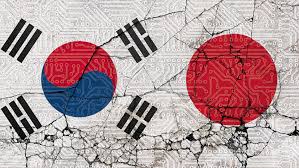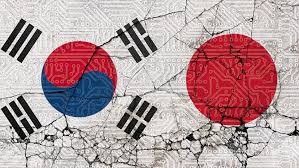
In the long run, there can be a backfire of the decision of Japan to curb exports of high-tech materials to South Korea and the country could see it dominating position in being the crucial link in the global chip supply chain could be eroded, according to suppliers and experts.
Last month, restrictions on the export of three crucial materials to the production of chips to South Korea was imposed by Japan which have hit some of the largest chip makers of the world based in South Korea such as Samsung and SK Hynix. This curb has created the potential to upend the global tech supply chain because the chip makers account for about 70 per cent of the restricted products to the world.
Even after the one time giants of Japan such as Sony lost out to nimble Chinese and Korean rivals, this move shows that Japan still holds a place of prominence in the industry. However the measures undertaken by Tokyo last month has also raised concerns that this dominant position of Japan in the world market for fluorinated polyimides, photoresists and hydrogen fluoride could be lost to a significant degree.
“South Korean companies cite quality and stable supply as reasons for choosing Japanese materials. But this has made them aware of the need for change and they are already taking action,” a source at a Japanese materials supplier was quoted in a report as saying. “This will hit us like a body blow.”
There are reports in recent weeks that claimed that alternative suppliers for photoresists and hydrogen fluoride are being finalized by some South Korean chip makers such as Samsung.
Companies such as Soulbrain are trying to attain the quality of Japanese hydrogen fluoride art their plants. Soulbrain supplies hydrogen fluoride to the Samsung and Hynix - the largest and the third largest chip vendor of the world.
However since the three high-tech materials are not easy to replicate, it will take some time for South Korean firms to match the quality of the Japanese products, say industry experts.
According to Atsushi Ikeda, Citigroup analyst, Japanese suppliers “have built up their capabilities through decades-long experience of developing products”. “The accumulation is just too big for new players.”
It takes up to two years to develop new resists, says top photoresist supplier Tokyo Ohka Kogyo.
The “rare earth shock” nearly a decade ago – a tussle between China and Japan, could be replicated in this case by South Korea and, like Japan back then, find alternate supplies following China’s curb on exports of rare-earth minerals to Japan that were used in electronic devices.
“Under the circumstances, anyone would do that,” said a report quoting a source at the Japanese supplier.
In order to speed up the acquisition of knowledge needed for companies to catch up in more advanced fields, the South Korean government has already promised huge subsidizes.
Paper work had been hastened by the South Korean government to hasten the completion of its new plant, a report quoted a senior executive at Soulbrain as saying. The report also said that the company aims to complete the construction of the plant by end of September and would be running tests to examine whether it would be able to mass produce hydrogen fluoride of high quality.
(Source:www.reuters.com)
Last month, restrictions on the export of three crucial materials to the production of chips to South Korea was imposed by Japan which have hit some of the largest chip makers of the world based in South Korea such as Samsung and SK Hynix. This curb has created the potential to upend the global tech supply chain because the chip makers account for about 70 per cent of the restricted products to the world.
Even after the one time giants of Japan such as Sony lost out to nimble Chinese and Korean rivals, this move shows that Japan still holds a place of prominence in the industry. However the measures undertaken by Tokyo last month has also raised concerns that this dominant position of Japan in the world market for fluorinated polyimides, photoresists and hydrogen fluoride could be lost to a significant degree.
“South Korean companies cite quality and stable supply as reasons for choosing Japanese materials. But this has made them aware of the need for change and they are already taking action,” a source at a Japanese materials supplier was quoted in a report as saying. “This will hit us like a body blow.”
There are reports in recent weeks that claimed that alternative suppliers for photoresists and hydrogen fluoride are being finalized by some South Korean chip makers such as Samsung.
Companies such as Soulbrain are trying to attain the quality of Japanese hydrogen fluoride art their plants. Soulbrain supplies hydrogen fluoride to the Samsung and Hynix - the largest and the third largest chip vendor of the world.
However since the three high-tech materials are not easy to replicate, it will take some time for South Korean firms to match the quality of the Japanese products, say industry experts.
According to Atsushi Ikeda, Citigroup analyst, Japanese suppliers “have built up their capabilities through decades-long experience of developing products”. “The accumulation is just too big for new players.”
It takes up to two years to develop new resists, says top photoresist supplier Tokyo Ohka Kogyo.
The “rare earth shock” nearly a decade ago – a tussle between China and Japan, could be replicated in this case by South Korea and, like Japan back then, find alternate supplies following China’s curb on exports of rare-earth minerals to Japan that were used in electronic devices.
“Under the circumstances, anyone would do that,” said a report quoting a source at the Japanese supplier.
In order to speed up the acquisition of knowledge needed for companies to catch up in more advanced fields, the South Korean government has already promised huge subsidizes.
Paper work had been hastened by the South Korean government to hasten the completion of its new plant, a report quoted a senior executive at Soulbrain as saying. The report also said that the company aims to complete the construction of the plant by end of September and would be running tests to examine whether it would be able to mass produce hydrogen fluoride of high quality.
(Source:www.reuters.com)





